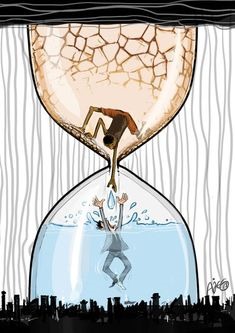Water and water resources is very important for maintaining an adequate food supply and a productive environment for the all living organisms. As human populations and economies grow, global freshwater demand has been increasing rapidly. In addition to threatening the human food supply, water shortages severely reduce biodiversity in both aquatic and terrestrial ecosystems.
The negative effects of global population increase, climate change impacts, and lifestyle changes are exerting growing pressures upon our vital water resources leading to widespread water stress in many countries. As a result, there is growing realisation of the urgent need to conserve water.Water is essential to life because it heavily influences public health and living standard. However, water is unequally distributed throughout the world. Water is a very important required substance in order to sustain vital activities of human such as nutrition, respiration, circulation, excretion and reproduction. In addition water is also a life space as well as being one of the basic substances in the formation of life environment.

Water is very important to the human body. Every one of your cells, organs and tissues use water to help with temperature regulation, keeping hydrated and maintaining bodily functions. In addition, water acts as a lubricant and cushions your joints. Drinking water is great for your overall health.
Water and water resources is very important for maintaining an adequate food supply and a productive environment for the all living organisms. As human populations and economies grow, global freshwater demand has been increasing rapidly. As a result, there is growing realisation of the urgent need to conserve water.
Why is water important to the economy & ecosystems?
Water is also vital to a number of other economic sectors. Water is used to extract energy and mineral resources from the earth, refine petroleum and chemicals, roll steel, mill paper, and produce uncounted other goods, from semiconductors to the foods and beverages that line supermarket shelves. Water cools the generators and drives the turbines that produce electricity, and sustains the habitat and fish stocks that are vital to the commercial fishing industry. Rivers, lakes, and oceans provide natural highways for commercial navigation.
In a market system, economic values of water, defined by its price, serve as a guide to allocate water among alternative uses, potentially directing water and its complementary resources into uses in which they yield the greatest total economic return
Water links and maintains all ecosystem on the planet. The role of water in the ecosystem is to provide the lifeblood of the community. As nature’s most important nutrients, people need water to survive. Water helps to transport oxygen, minerals, nutrients and waste products to and from the cells.
The main function of water is to propel plant growth; provide a permanent dwelling for species that live within it, or provide a temporary home or breeding ground for multiple amphibians, insects and other water-birthed organisms; and to provide the nutrients and minerals necessary to sustain physical life
What are the most important ecosystems?
5 of the World’s Most Mind Blowing Ecosystems [LIST]
- AMAZON RAINFOREST– SOUTH AMERICA. The 1.4 billion acres of rainforest is mostly concentrated in Brazil but spans eight other South American countries.
- GREAT BARRIER REEF- AUSTRALIA.
- SUNDARBANS– BANGLADESH & INDIA.
- NAMIB DESERT– NAMIBIA & ANGOLA.
- TONLE SAP LAKE– CAMBODIA.
Water value and competition will rise
Available data does not reflect water’s true worth in the economy. For example, pricing does not usually reflect the marginal value enjoyed by Americans in having safe tap water available from community water systems 24 hours a day, which is a benefit that many citizens in other countries do not enjoy. As a result of water being undervalued, current use may be inefficient and unsustainable. Also, competition for water will increase as consumption rises, water quality decreases, and the impacts of climate change are felt
Today, water is considered an economic good, by means as to how it is considered in our current day. Economic goods are those which are subject to a production activity; thus, they are good which require labor, time, technology and allocation of resources.
In economics, water is considered to be a normal economic good. This follows directly from the economic definition that water is a “scarce good” and therefore an “economic good”. In common economic understanding, a good is said to be scarce if it carries opportunity costs.
- Improved water supply and sanitation and improved water resources management boost countries’ economic growth and contributes greatly to poverty eradication.
- The economic benefits of improved water supply and – in particular – sanitation far outweigh the investment costs, surprisingly good news for Northern and Southern decision makers who often view investments as mere costs.
- National economies are more resilient to rainfall variability, and economic growth is boosted when water storage capacity is improved.
- Investing in water is good business – improved water resources management and improved water supply and sanitation contributes significantly to increased production and productivity within economic sectors.
- The overall public and private investment needs for improved water supply and sanitation and improved water resources management are considerable. However, at the country level, meeting such investment challenges is highly feasible and within reach of most nations.

Better access to clean water, sanitation services and water management creates tremendous opportunity for the poor and is a progressive strategy for economic growth. This report articulates the close link between water and the economy and makes the case that investing in water management and services is absolutely essential for the eradication of poverty and is a necessary condition for enabling sustained economic growth.
The poor gain directly from improved access to basic water and sanitation services through improved health, averted health care costs and time saved. Good management of water resources brings more certainty and efficiency in productivity across economic sectors and contributes to the health of the ecosystem.
Do the Earth a favor ….!
Be a water saver …. !!

